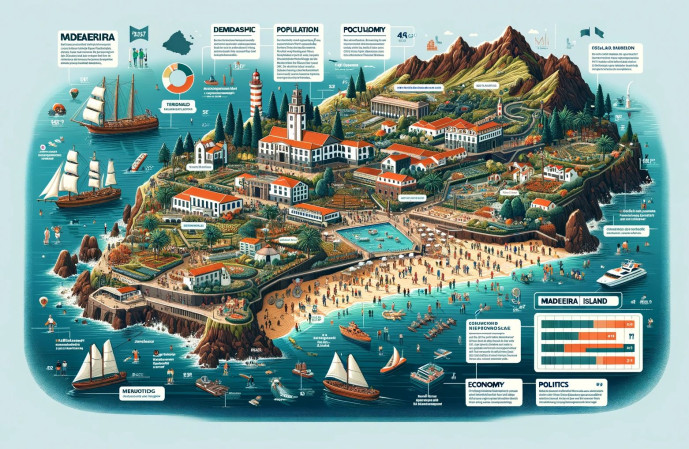Key Facts of Madeira Island: Demogragphy, Population, Economy, Politics, etc…
Discover Madeira's vibrant culture, growing economy, and diverse population in a snapshot.

Geography & Demographics
Location & Archipelago
- Autonomous Region of Portugal: Madeira is an integral part of Portugal but enjoys a significant degree of political and administrative autonomy, shaping its unique local character.
- Archipelago in the Atlantic: The destination is not a single island but a group of them. The main islands of Madeira and Porto Santo are the only inhabited ones. The smaller Desertas and Savage Islands are designated as protected nature reserves, vital for their unique ecosystems and birdlife.
- Proximity: Geographically, the archipelago is situated in the Atlantic Ocean, notably closer to the African continent than to mainland Europe.
Population Overview
- Total Population: The islands are home to approximately 250,000 permanent residents, creating a community that is both intimate and cosmopolitan.
- Main Urban Centers: The capital, Funchal, is the vibrant heart of the island where a large portion of the population resides. Other important towns you may visit include Machico, the historic first landing site; the picturesque fishing village of Câmara de Lobos; and Santa Cruz, home to the international airport.
- Madeiran Diaspora: You will find that Madeira has a far-reaching global presence. Significant communities of Madeiran emigrants and their descendants thrive in countries like South Africa, Venezuela, and the United Kingdom, fostering strong international connections.
Language
- Official Language: The official language is Portuguese.
- English Proficiency: In Funchal and other areas accustomed to international visitors, English is widely spoken, particularly within hotels, restaurants, and tour companies. While communication is generally straightforward for English-speaking travelers, learning a few basic Portuguese phrases like ‘bom dia’ (good morning) or ‘obrigado/obrigada’ (thank you) is always a warmly received gesture.
Governance & Politics
An Autonomous Region
- Relationship with Portugal: Madeira is one of Portugal’s two autonomous regions, the other being the Azores. This status grants it a distinct identity within the Portuguese Republic.
- Self-Governing: The region possesses its own regional government and legislative assembly, which manage a wide range of local affairs, from health and education to infrastructure.
- EU Membership: As a part of Portugal, Madeira is fully integrated into the European Union. This is why the local currency is the Euro, and travelers from other EU member states can enjoy seamless entry and certain rights.
Local Laws & Etiquette
- General Laws: The legal framework is that of Portugal. For visitors, the laws and regulations will feel entirely familiar to those in any other European Union country, with no unusual or specific local laws to be aware of.
- Political Stability: The region is known for its long-standing political stability and is considered a very safe and secure destination for travelers.
Economy
Key Industries
- Tourism: The primary driver of the Madeiran economy is tourism, sustained by a pleasant year-round climate and a diverse offering of natural and cultural attractions.
- Agriculture: The island’s fertile volcanic soil supports a rich agricultural tradition. It is globally renowned for its fortified Madeira wine, and you will see hillsides terraced with banana plantations and fields growing unique subtropical fruits. This agricultural heritage directly translates into the fresh, flavorful food and drink you will experience during your stay.
- International Business Centre (IBC): A significant, though less visible, component of the economy is the IBC, which provides favorable tax conditions to attract international companies and investment to the region.
Currency & Banking
- Currency: The official currency is the Euro (€).
- Cash & Cards: Major credit and debit cards, such as Visa and Mastercard, are widely accepted in most hotels, restaurants, and shops. It is advisable, however, to carry some cash for smaller local cafes, public markets, or purchases in more rural areas.
- ATMs: Automated teller machines are easy to find in all towns and cities. Look for signs for ‘Multibanco’, which is the national ATM network.
Cost of Living Snapshot
The cost of goods and services in Madeira is generally more affordable than in major Western European capitals like London or Paris. While certain imported items can be slightly more expensive than on mainland Portugal due to logistics, everyday expenses are reasonable. As a simple comparison, a meal at a mid-range restaurant or a cup of coffee is competitively priced, offering excellent value.
People & Society
Religion
- Predominant Faith: The population is overwhelmingly Roman Catholic, a faith that is deeply woven into the island’s cultural fabric.
- Cultural Impact: This religious heritage is highly visible in the many beautiful churches found in every parish and influences numerous local festivals and public holidays throughout the year. If you plan to visit a church, we advise dressing respectfully, which typically means covering your shoulders and knees.
Major Public Holidays
Being aware of public holidays can be helpful, as banks and some shops may be closed. However, these dates often coincide with vibrant local festivities. Key dates to note include:
- Portugal’s National Day: June 10
- Madeira Day: July 1 (a regional holiday celebrating autonomy)
- Christmas & New Year’s: December 25 & January 1. Funchal is world-famous for its spectacular New Year’s Eve fireworks display, which is a major highlight of the year.
- Carnival: Dates vary each year, typically in February or March, featuring lively parades and celebrations.
- Flower Festival: Dates vary, usually held in the Spring. This is one of the island’s most beautiful events, with parades of floats adorned with countless flowers.